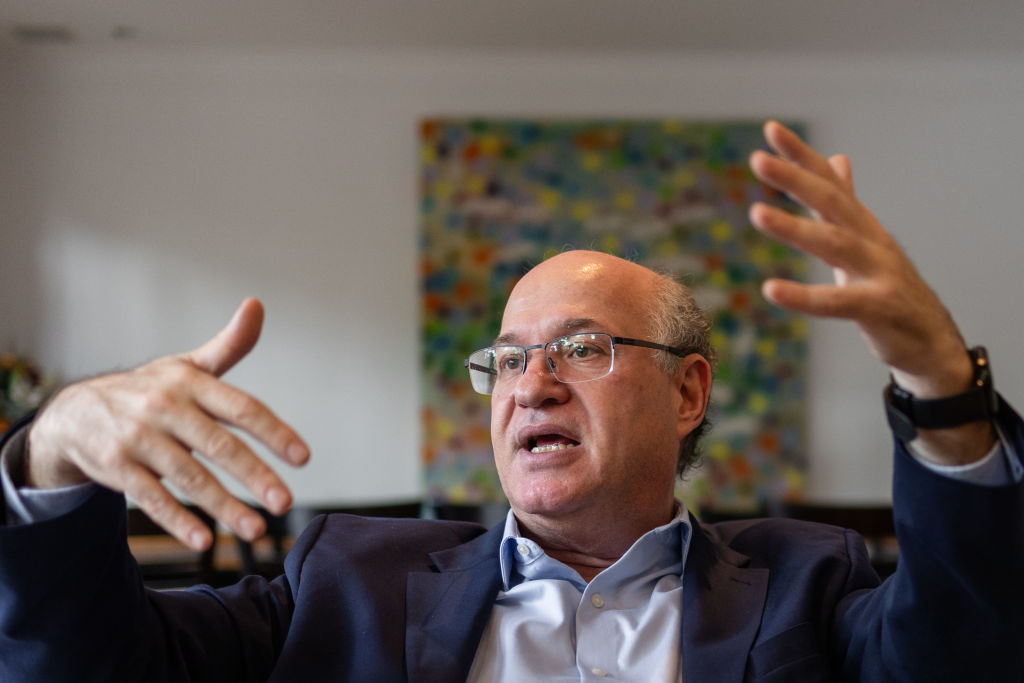WASHINGTON — He is the man who accomplished the nearly impossible: Getting Jair Bolsonaro and Luiz Inácio Lula da Silva to agree on something.
Nominated for his job by the former Brazilian president and confirmed by the current one, Ilan Goldfajn has had some success navigating the Americas’ profound political divides over the past year and a half as the president of the region’s Washington-based multilateral lender, the Inter-American Development Bank, or IDB.
Bespectacled and good-humored, the Israeli-born Goldfajn, 58, has drawn on his experience at Brazil’s central bank and in the private sector to address the many challenges facing the IDB: Competition from other lenders including the Chinese, the region’s increasing vulnerability to climate change, and the need to more effectively measure the impact and efficiency of its more than $20 billion in annual lending.
But perhaps the biggest minefield has been political.
Today’s Latin America is a region where presidents routinely insult each other on social media; some refuse to talk to each other at all, making greater regional integration, part of the IDB’s official mandate, vastly more difficult. The IDB bears its own scars from 2022, when Goldfajn’s predecessor, Mauricio Claver-Carone, was ousted by the board following allegations of misconduct. (Claver-Carone denied any wrongdoing and blamed the Biden administration, among others, for his departure.)
When I visited the IDB for a few days in May, I asked Goldfajn how he was managing such a polarized environment.
“Well,” he said with a smile, “I’m a technocrat. The most boring people in the world are central bank governors, right? They’re not politicians. I’m not here to… nobody thinks of me as looking at this as a trampoline.” He called his own nomination “a major sign that we can get out of the polarization if we want.”
“You have to look for points of consensus,” he continued, citing the recent capitalization of IDB Invest, the bank’s private-sector arm, similar to the International Finance Corporation at the World Bank. The IDB’s board, composed of representatives from Latin American governments, the United States and other countries, approved in March a $3.5 billion capital increase for IDB Invest, as well as $400 million for IDB Lab, its innovation and venture capital arm. The increase is still being finalized.
“Why are we having the capitalization under IDB Invest and not IDB? We found a consensus on the private sector side,” Goldfajn told me. “Because they agree with everybody that the private sector should be the engine of growth. Everybody agrees we are middle-income countries. Productivity (increases) are nowhere to be seen the last few decades. Climate needs the private sector because you cannot do it by yourself.”
“So everybody agrees on that. Let’s go. We got an agreement.”
A “change of culture”
But that doesn’t mean he’s shying away from conflict. Goldfajn said he was trying to “change the culture” of an organization that has been around since 1959, and is sometimes criticized around the region as insular and inefficient. Goldfajn singled out what he described as the IDB’s traditional focus on lending as its main “metric” of success.
“People use it like if I tell you how much I lend, you can know how much I’m doing. Unfortunately this relation has completely broken,” he said. “The whole exercise now is … every presentation, every program (we ask): Why are we doing this? Tell me the ultimate goal.” He cited three measures of success: 1) Poverty reduction 2) Climate adaptation and mitigation and 3) Productivity and growth.
This emphasis on efficiency has indeed ruffled feathers among some current and former IDB staffers, some of whom complain Goldfajn is trying to bring private-sector values, and sometimes sharp elbows, to an organization with multiple stakeholders that by its nature needs to move methodically.
But the focus on results may make sense at a time when Latin America’s economies are a mixed bag, with average growth forecasts for the region of about 1.9% this year and 2.7% in 2025. Those numbers compare favorably to the 0.9% average GDP growth in the five years prior to the COVID-19 pandemic, but trail other emerging market groups in Asia, the Middle East and Africa.
“I think IDB has very good potential to be really a game changer in terms of climate, social, but also maybe making Latin America grow again,” Goldfajn said.
He cited security as an area in which the IDB is facing “huge demand” for both financial resources and expertise. Organized crime is not a new challenge in Latin America, but the amount of cocaine being produced in the region has doubled in the past decade, according to the United Nations, creating a windfall for gangs and cartels. The map of where drugs are distributed has also shifted, with Asia and Latin America itself becoming larger consumer markets, bringing turf wars and other violence to previous relative safe havens such as Ecuador, Costa Rica, Uruguay and several Caribbean nations.
“We ask the private sector: ‘What do you need from the IDB?’ What they really ask for is, can you help me with stability – rule of law, economic stability and increasingly security. You cannot invest in places where organized crime dominates,” Goldfajn said.
Other challenges the IDB is addressing include the humanitarian and governance crises in Haiti, as well as an effort to better measure deforestation across the Amazon, rather than just in individual countries. The bank’s loans also support healthcare for “underserved” populations in Brazil, broadband access in Costa Rica and efforts to stabilize electricity prices in Chile.






